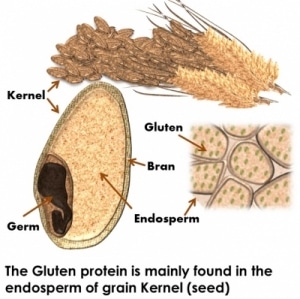Gluten Free: Why and Why Not
Published on January 2, 2015 by Dr. Caitlin Gordon
Reasons why I tell patients to cut gluten (not what you think!)
There is no doubt that the gluten craze is a current trend. So how much truth is there in this idea that by cutting out gluten you can experience relief from a variety of symptoms, lose weight, feel more energized?
First, I recommend watching this video:
Now that the basics have been covered, I want to explain why I recommend cutting gluten for certain patients of mine, even though statistically speaking, it is unlikely they all have an allergy or sensitivity.
I recommend the following types of patients try cutting out gluten:
- asthmatic
- eczema
- overweight
- many allergies
- Hashimoto-type hypothyroid
- Anxiety/Depression/ADD
- Migraines or frequent headaches
- some other types of autoimmune conditions
- certain types of digestive complaints
I do this for a few different reasons:
1. First, those patients with autoimmune conditions are responding to something in the environment that their bodies see as a foreign invader. It could be environmental, diet, chemical… who knows. But by far the most common is a dietary component. The most common dietary sensitivities are gluten, corn, soy, and dairy. Of course, it is a small percentage of people who have a true sensitivity, but in certain populations, this percentage is higher: Hashimoto hypothyroid, asthma, other autoimmune conditions. So I’ve already narrowed my pool compared to the % of the normal population.

For patients with an under-functioning thyroid, going gluten-free may help them to reduce their medication, stop their medication, or feel better on their current dosage. There is good research that in those sensitive to gluten, ingesting it may manifest as the body attacking the thyroid gland leading to hypothyroidism—there is actually a smaller genetic component than people conventionally believe, and a much larger association with autoimmune responses, childhood antibiotic usage, etc. I was diagnosed as hypothyroid at 15. The cause was likely overuse of antibiotics as a child causing damage to the balance of microflora in my gut which can lead to permeability. This means stuff that isn’t supposed to be able to pass through the mucosal lining of the stomach does. Gluten is one such thing. The body sees it as a foreign invader because protein bits that aren’t broken down shouldn’t be floating around the blood. That auto-immune response can be targeted at the thyroid gland. In my case, and many others, cutting out gluten meant my digestive issues resolved, my hair loss stopped, I had more energy AND I got to reduce my thyroid medication dosage.
For patients with seasonal allergies or asthma, these issues stem back to gut health as well. Allergies are a sign that your immune system has become overactive. Your immune system has its panties in a twist because of the health of your digestive system, most likely. This is because most of your immunity comes from the healthy balance of bacteria in your gut, and the ability of your intestines to absorb nutrients properly. When your gut flora becomes out of whack (either from using NSAIDs, antibiotics, stress, or poor diet choices–too much sugar often), then your immune system starts to go haywire. Allergies are a histamine response and a sign of inflammation. Gluten, and more broadly refined grains, are inflammatory for most people, and often worsen histamine response. Try cutting them out, and see how you feel.
Some individuals with anxiety, depression, ADD or other mental clarity complaints feel a huge difference when they cut out gluten. This is because any type of food allergen causing inflammation in your gut can affect the way your brain works. The brain/gut connection is well documented. A wonderful book for learning more about this is Grain Brain and Why Isn’t My Brain Working. Check out my review of Grain Brain.
Because gluten and refined grains cause many people to suffer digestive complaints, if you’re experiencing irritable bowel syndrome, constipation, chronic diarrhea, cramping, bloating, or gas… try cutting grains. Increase veggies, and grass-fed protein and add a high-quality probiotic and tell me your symptoms don’t improve. It is a rare bird who doesn’t feel better when they make these changes.
2. The second reason I tell people to cut out or reduce gluten is because it’s an easy way to get them eating better. What cutting out gluten does for MOST people is it greatly reduces the amount of bread, pasta, and cookies/cake/pastry items they consume. This is healthy for everyone! Granted, if you replace gluten with a lot of processed gluten-free alternatives, this strategy does not work. It’s not all about the gluten (although modern gluten is inflammatory), it’s about cutting the refined grains. But it is much more difficult to tell someone, cut all refined grains. There’s no marketing campaign behind that. Making it about gluten creates some rules which make the diet easier to follow.
Bread and pasta break down almost instantly into sugar. Sugar is highly inflammatory. Anyone in pain, trying to lose weight, at risk for heart disease, diabetes etc. needs to be on a lower grain, no-refined-grain, sugar-free diet. Grains send your blood sugar up and down and these fluctuations are at the root of almost all chronic disease—damage to the lining of our blood vessels being the most insidious, as it causes our cholesterol to rise in an attempt to repair it, then creates plaque buildup in the vessels leading to heart disease, stroke, etc. Over a lifetime, blood sugar fluctuations cause our insulin receptors to dis-regulate so they no longer recognize sugar properly and this causes pre-diabetic symptoms and then full on diabetes. The glucose (sugar) swimming around in our blood (now that the cells insulin receptors won’t absorb it) further creates an inflammatory environment, especially in our gut, and causes our immune systems to believe we need to activate against our own body—all that sugar isn’t supposed to be floating around in our bloodstream! Here we get autoimmune conditions, and eventually cancer because our immune systems are preoccupied with trying to deal with the number of toxins/sugar/etc. in our bloodstream instead of killing off mutated cells, and those cells are free to reproduce.

Phew! It’s a complex process. Point being: fewer grains, higher protein, and vegetables are good for nearly everyone. The reason so many people think they are gluten sensitive (in my opinion) is that they feel much better going gluten-free. When they are gluten-free, and eating fewer breads and pasta and cookies, their blood sugar is much more stable—this leads to weight loss, more energy, fewer headaches, more even mood, and a whole host of other benefits. Then, when someone eats gluten again (a bowl of pasta let’s say) they feel really shitty—because they’ve sent their blood sugar up and back down. They feel sluggish, headachy, bloated, whatever. Probably not actually the gluten at all. Of course, some people go gluten-free and just eat a bunch of refined gluten-free products made with potato flour and corn, and that’s not going to solve much—those are usually the people who determine they feel no different cutting out gluten and are not “sensitive”.
It might not be gluten!
Interestingly, dairy is another culprit which causes many people to experience a range of vague icky feelings: fatigue, bloating, cramping, gas, acne, constipation, headaches, etc. Some people may mistake a dairy sensitivity with a gluten sensitivity since many people eat dairy products almost every time they have gluten (sandwiches, pizza, pasta, cake, etc.). Many people don’t make enough of the enzyme required to digest dairy properly since our bodies are designed only to consume breast milk and only as an infant. Read more about dairy issues here.
Another possible cause for these types of symptoms is low HCL (stomach acid). This is a widespread common problem as stress reduces the amount of stomach acid the body produces. It is an easy fix, taking HCL supplements with high protein meals, and after a few months the body will naturally start producing more stomach acid and you won’t need the HCL pills anymore.
Gluten-sensitivity symptoms are very similar to Yeast Sensitivity symptoms and Fructose Malabsorption. Rule out these as possible causes of your digestive upset.
If you think you may have a gluten-sensitivity or a condition which could be helped by adjusting your diet, please schedule an appointment to discuss a plan!
How do I test for a food sensitivity?
The best way to determine if you have a problem with gluten (or dairy, or any other food for that matter), is to write down a list of your current symptoms and rate them in frequency and severity (1-10 scale). Cut out the food (Gluten/dairy/nuts/eggs/whatever) for 3 full weeks. At the end of the 3 weeks make a list of your symptoms again including frequency and severity, without looking at your original list. Now compare lists. If the results are ambiguous, reintroduce the food. After 1 week of eating it every day make another list of your symptoms. You should get some clarity with this exercise, and it is more accurate than food allergy testing, albeit a bit more work.
You can also order food allergy testing with me at your acupuncture appointment. It will be a blood test which you will get at a local lab, and then the results will be mailed in 2-3 weeks. This has a 30% false positive rate, so keep that in mind. They can be a great indication of gut permeability issues, autoimmune conditions, and other larger digestive problems. Tests run between 150-500$ depending on how many foods and other allergens you want to test.
Why NOT to go gluten-free
Oftentimes, people try to reduce their gluten intake or cut it out completely simply because they think it’s healthier. If you do not have a health condition which is aggravated by gluten, cutting it out is not necessarily any healthier.
Do not delude yourself that eating gluten-free bread instead of regular bread makes you healthier. Or that because the chocolate covered peanuts you bought say gluten-free, they are healthy. Gluten-free bread is full of processed rice and potato flour, agave or sugar, and fillers like xantham gum. A sprouted grain, organic, high fiber wheat bread would be healthier. If you don’t have any reason to believe you have a sensitivity to gluten, there is nothing inherently wrong with it. The problem lies in dysregulated immune systems which view gluten as an allergen. Organic, GMO-free sprouted grains tend to be digested well by people with healthy digestive and immune systems.
Another problem with going gluten-free is that most of the wheat substitutes contain rice. All kinds of rice are contaminated with arsenic (the stuff you use to kill rats), even organic brown rice. Eating a diet high in processed rice products, or even organic brown rice can put you at risk for health problems associated with high levels of arsenic. “Regular exposure to small amounts of arsenic can increase the risk of bladder, lung, and skin cancer, as well as heart disease and type 2 diabetes.”
The healthiest bet is always going to be avoiding any processed grains. Quinoa, Amaranth, Millet, Buckwheat and polenta (GMO-free) are healthy gluten-free grains which do not contain high levels of arsenic. Bulgur, barley, and farro are gluten-containing grains which also have low levels of arsenic and tend to cause less sensitivity than wheat for individuals without gluten issues.
Sources:
Autoimmune thyroid disorders and celiac disease
Antigliadin antibodies in autoimmune thyroid disorder
Thyroid disorders and celiac
Arsenic in Rice
Gut-Brain Connection
Wheat and Inflammation
If you’re unconvinced Gluten is Inflammatory: Listen To This
The contents of this site, including text, graphics, images, and other material are for informational purposes only. Nothing contained in this site is or should be considered or used as a substitute for professional medical or mental health advice, diagnosis, or treatment. Please schedule an appointment for personalized health advice.






